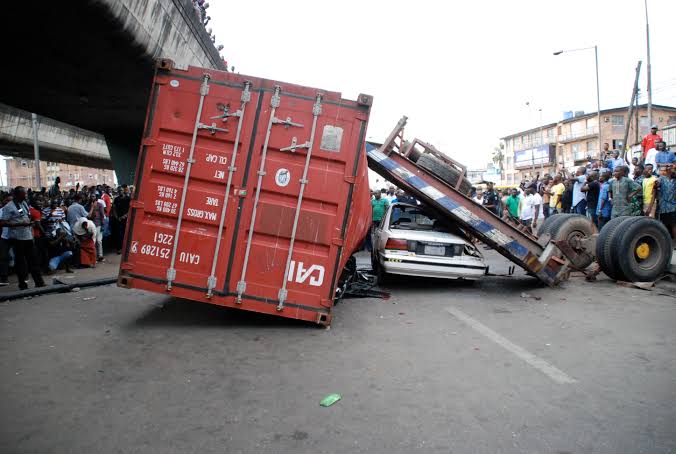By Oluyinka Onigbinde

In an apparent positive shift towards road safety, findings by Shipping Position Daily have revealed a notable 13.33% reduction in road traffic collisions (RTC) involving trucks and trailers in the first half of the year 2023 compared to the same period last year in Lagos state.
This is according to data and analytical examination conducted by the Federal Road Safety Corps (FRSC), the report of which was obtained exclusively by our correspondent last week.
The findings depict a downward trend in accidents associated with articulated vehicles, suggesting potential progress in the FRSC’s ongoing efforts to enhance road safety measures. The analysis indicates that a total of 143 road traffic incidents were reported during the initial six months of 2023, signifying a substantial decrease from the 165 incidents recorded in the same timeframe in 2022.
The data revealed that May this year recorded the highest number of truck accidents in the state with 34 recorded accidents, while January had the lowest with 16 recorded cases of truck and trailer accidents.
The data further highlight a 20% reduction in accidents and a noteworthy 60% reduction in fatalities for the year 2022.
The report also underscores the ‘proactive role’ of FRSC Officers in identifying and addressing safety issues.
The report says that “Over the same period, these officers rectified 1247 cases of braking system malfunctions and effectively managed 72 incidents of tanker leakages at various depots”.
However, the report attributed some of the accidents to activities of non-state actors and hoodlums who waylay the trucks and attack drivers.
It drew a correlation between acts of vandalism, assaults by local individuals attempting to control loaded trucks, and accidents near the Mile 2 Interchange.
In a chat with the FRSC sector commandant Lagos state Babatunde Farinloye, he attributed this apparent improvement to the implementation of the “Safe-to-Load” Programme by the FRSC, which aims to bolster safety protocols for wet cargo truck operations in petroleum terminals and depots.
While acknowledging successes in the wet cargo sector, Farinloye acknowledge the need for a comprehensive strategy to address challenges within the domain of dry cargo haulage trucks, particularly flatbed trucks.
He said, to tackle these concerns, the FRSC partnered with the Nigeria Port Authority (NPA) to replicate safety achievements.
According to him, concerns linger due to unsafe practices stemming from scattered bonded terminals along the logistics chain between ports and cargo destinations. As a solution, Farinloye emphasize rigorous driver awareness programmes and targeted enforcement actions against non-compliant truckers nationwide.
He also called for a collaborative, multi-sectoral approach supported by political commitment. According to him, “the FRSC’s intervention in wet cargo truck safety management through the Safe-to-Load Programme at the petroleum terminals and depots has evidently continued to elevate tremendously the safety plateau of tanker truck operation”.
Giving details, he said: “Available statistics depicted 20% and 60% reduction of crashes and fatalities in the state 2022. It is salient to state that 1247 cases of braking system deficiencies with 72 tanker leakages were detected, prevented and/or corrected by FRSC Officers at the depots over the same period. The vandalization and attacks of area boys chasing and struggling the control of loaded trucks with the drivers were also directly linked to two crashes around Mile 2 Interchange.
“In the quest for solution to the safety problems of the dry cargo haulage trucks (flatbed), the Corps has entered into MOU with the Nigeria Port Authority towards replication of the success recorded in the wet cargo sector.
“ However, the existence of spatially dispersed bonded terminals as holding and transfer points along the logistic chain between the ports and cargo destinations has created opportunities for unwholesome and unsafe practices that endanger lives on our highways.
“As the immediate interventions, I have directed the aggressive enlightenment of the drivers with stakeholders and the fortnight special operations targeting these bad truckers across the federation while the Corps develops a more sustainable and less intrusive proactive interventions”.
In response to the data, Mr. Rilwan Bello, Vice President of the National Association of Maritime Transport Operators (NAMTOP), agreed with the sector commander’s assessment. Bello emphasizes the partnership between the association and the FRSC, which involved educating drivers about potential road hazards and the importance of adhering to road regulations. Measures such as assigning road marshals to hazardous areas have contributed to this reduction in accidents.
On his part, Bala Mohammed, the Secretary General of the Association of Maritime Truck Owners (AMATO), highlighted the group’s proactive stance in response to containerized truck accidents on roads and highways, particularly in Lagos state.
He noted that the observed decrease in truck and trailer accidents during the first half of 2023 reflects the potential impact of collaborative efforts, programs, and awareness campaigns on road safety in Lagos state.
He said AMATO launched a safety sensitization campaign targeting parks and garages to ensure their members prioritize safety precautions. This, he added involves maintaining trucks in optimal condition, discouraging alcohol consumption among drivers, and promoting adherence to rules and regulations, all in collaboration with the FRSC.
Additionally, he informed that AMATO is in discussions with the Lagos State Driving Institute to enhance professionalism within the trucking business through driver training initiatives.















